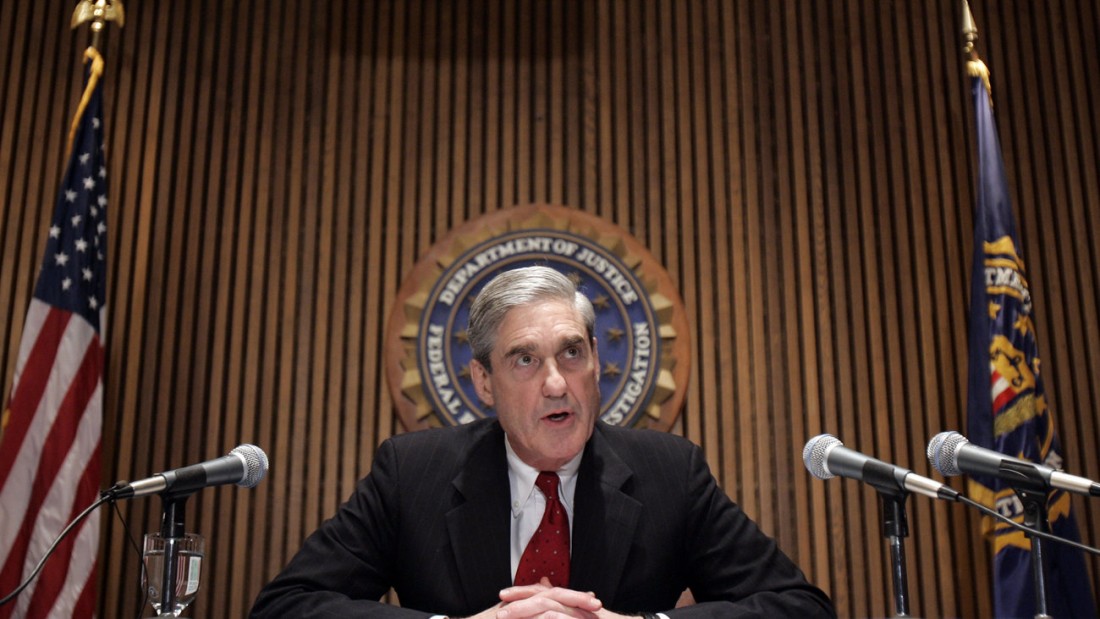
The Russia Investigations: Trump Reportedly Wanted To Fire Mueller; D.C. Dumbstruck. A journalist describes Robert Mueller, pictured in 2007 when he was FBI director, as “about as apolitical and nonpartisan a figure as you could find in Washington.” (photo credit Susan Walsh/AP).
NPR, “Mueller’s Reputation In Washington Is ‘Stunningly Bipartisan,’ Journalist Says”, 1 Feb 2018:
As the investigation into the Trump campaign and Russian interference in the 2016 election forges on, Robert Mueller, the Justice Department special counsel leading the investigation, has managed to stay largely out of public view.
Journalist Garrett Graff says that is in keeping with Mueller’s personality: “This is not someone who in any way has tried to grab the spotlight, but instead has kept his head down and worked hard throughout his career.”
Graff’s 2011 book, The Threat Matrix, explores the transformation of the FBI under Mueller’s leadership. Appointed by President George W. Bush, Mueller took over as director of the FBI one week before the Sept. 11 attacks. After Mueller completed his 10-year term as FBI director, President Barack Obama reappointed him for a two-year term, which required a special act of Congress.
“Bob Mueller is probably about as apolitical and nonpartisan a figure as you could find in Washington, particularly at the levels of government in which he has served,” Graff says. “This is someone who really, truly believes in truth, justice [and] in the American way, in a way that very few people in American life today anymore do.”
Interview Highlights
On Mueller’s bipartisan record
We know him most recently, obviously, as the FBI director, but his tenure in government really dates back to the Reagan years. And he’s been appointed or held top jobs in the administrations of all five of the last presidents, and was appointed to the Justice Department, the head of the criminal division, under George H.W. Bush’s administration, then was appointed a U.S. attorney by Bill Clinton, then appointed the acting deputy attorney general by George W. Bush, and then later FBI director — a position he was reappointed to, in an unprecedented move, by President Obama and confirmed by the U.S. Senate by a vote 100-0, a stunningly bipartisan track record in today’s times.
On Mueller’s military service
Part of what makes Bob Mueller such a fascinating character is he has dedicated his life sort of time and again to public service. ... Mueller and a handful of other colleagues ... [signed] up for Vietnam after college. This was early in the 1960s, so it was before Vietnam became the cultural touchpoint that it did later.
White House Touts ‘Unprecedented’ Cooperation Amid Mueller Interview Talks
Second Lt. Marine Corps Bob Mueller ended up leading a platoon in the jungles of Vietnam for a year and really distinguished himself in combat. He received a Bronze Star with valor for his leadership in an ambush that his unit suffered in the fall of 1968, and then was actually shot himself in a separate incident in April 1969 where he received, of course, the Purple Heart and was quickly back on patrol, serving out the remainder of his year.
He came into the F.B.I. in part, in the summer of 2001 because he was known inside the department as a computer-guy. He had help found the Justice Department’s first real computer crime unit. And, the FBI in the summer of 2001 had this incredibly outdated computer system…
On how the FBI changed after the Sept. 11 attacks
Bob Mueller, in the days after Sept. 11, sees this incredible sea change in the mission of the FBI, which until then for most of its first 90 years had primarily been a law enforcement agency focused domestically on solving crimes after the fact. And on Sept. 11, we saw an international plot that focused on a suicide attack with catastrophic results, and that that necessitated this top-to-bottom change in the way that the United States approached counterterrorism issues, that after-the-fact investigation was going to be inadequate in the face of these threats.
So Mueller was given a mission by [former Attorney General] John Ashcroft and President Bush to not just investigate attacks afterwards, but to stop plots in the first place, to disrupt the attack before it happened.
It led to this massive reorganization that Bob Mueller spent the next 12 years of his tenure working on, to move the FBI from what was traditionally a domestic law enforcement agency into something that is more akin to an international intelligence agency.
On how Mueller’s investigation into the Trump campaign is similar to other FBI investigations
This is, in many ways, a perfectly standard and routine FBI investigation. The FBI, as an investigative agency, takes down corrupt organizations, that’s what it’s designed to do, go after street gangs, drug cartels, organized crime families, and the way that they do that is by starting on the outside and working their way in. And so that can either mean starting at the bottom of an organization, or starting with ancillary charges and working their way inwards, the equivalent of getting Al Capone for tax evasion.
